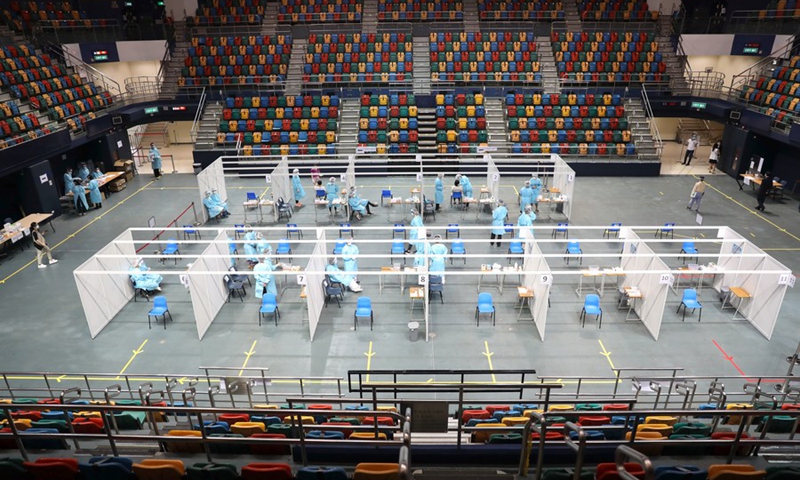Hong Kong finishes mass COVID-19 testing, prepares for health QR code

Photo taken on Sept. 1, 2020 shows a COVID-19 testing station at the Queen Elizabeth Stadium in Hong Kong, China. (Xinhua/Wu Xiaochu)
Hong Kong is braced for a new health tracking QR code system that will come into use soon after the city completes its citywide COVID-19 testing program, during which a total of 1.719 million people have been tested and 26 new confirmed cases have been identified.
The Hong Kong Special Administrative Region (HKSAR) officially kicked off its mass nucleic acid testing program on September 1, as local authorities believe it is the best way for the city to bring the epidemic under control and reopen its economy. The program was originally scheduled to last seven days, but the SAR government has since extended the testing period twice, with the latest end date set for September 14.
As many as 1,719,000 residents have been tested for COVID-19 in the program as of Sunday, accounting for 22.9 percent of the city's population, the HKSAR government said.
At least 160 people have been prevented from contracting the disease through the program as one confirmed case may at most infect four other people and trigger more infections via the second and third generation transmission, said Anthony Wu, president of a diagnostic center participating in the mass testing.
Wang Peiyu, a deputy head of Peking University's School of Public Health, told the Global Times on Monday that the mass testing is significant in controlling the third epidemic wave in the city and cutting the virus transmission of the identified patients.
The program has helped the HKSAR government to understand the whole situation of the epidemic at the community level and has achieved its final goal, said Patrick Nip Tak-kuen, secretary for the Civil Service of the HKSAR Government that has been in charge of the program.
Dr Hung Fan Ngai Ivan, a clinical professor at the Department of Medicine of Hong Kong University, estimated that there were still 40 to 50 potential patients in Hong Kong and believed it would take another four to six weeks before the new cases are cleared, according to media reports.
Hong Kong reported 19 new COVID-19 confirmed cases on Sunday, bringing the total number to 4,958, according to statistics from the Hong Kong Centre for Health Protection.
Paul Chan Mo-po, the finance secretary of Hong Kong, the HKSAR needs to prepare for a "normalization" of epidemic prevention and control mechanisms in the city through enhanced citywide testing capacity and the introduction of a health code system when the epidemic is under control and no local cases of unknown origin are found.
Hong Kong health codes might be launched in late September at the earliest. Some testing institutes in Hong Kong have been expanding testing to up to 50,000 samples per day, preparing for a potentially large market when the codes are launched, according to local media.
Hung Kam-in, a member of the Kwun Tong District Council in Hong Kong, told the Global Times on Monday that it might still take some time before Hong Kong and the mainland can share one health code system as Hong Kong has yet to fully control the epidemic.
"But I personally hope that we can have a mutually recognized code system as soon as possible to facilitate the exchange between Hong Kong and the mainland," Hung said.
The QR health code system aims to facilitate cross border travel for residents and revive Hong Kong's economy by helping residents get exemptions from 14-day quarantine through mutually recognized nucleic acid testing results, according to an email that the Hong Kong Innovation and Technology Bureau, which is in charge of the system, sent to the Global Times on September 7, noting that they understand local residents look forward to restoring travel between Hong Kong, the mainland and Macao as soon as possible.
The system has proved to be very helpful for daily epidemic prevention and control based on the experience from the mainland, Wang Peiyu noted.
As for some anti-government separatists' smearing of Hong Kong's introduction of the health code system, Hung believes it is outright distortion.
"During the epidemic outbreak, the implementation of health codes can greatly facilitate citizens' daily transportation, rather than being a hindrance," Hung said.
The number of confirmed cases identified in the testing was consistent with the trend of the epidemic easing in the city and showed that the epidemic wave is about to end, he said.
While the city's third wave of epidemic is expected to come to an end soon, the testing for some specific and high-risk groups in Hong Kong will not stop after the mass testing program ends.
Groups such as the elderly and physically challenged, public transport agency staff, hotel and restaurant workers, and government front-line civil servants will receive repeated testing by the government. 490,000 tests have been conducted among these groups in recent months.
The Social Welfare Department of the HKSAR government will reportedly carry out the third round of tests for care homes for the elderly within the next week.
